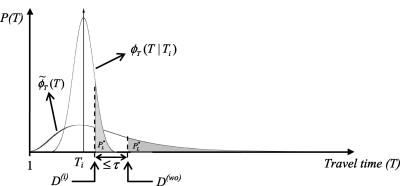On the value of highway travel time information systems |
| |
| Affiliation: | CENIT – Center for Innovation in Transport, Civil Engineering School, UPC – Barcelona Tech, Jordi Girona 1-3, Building B1, Office 114, 08034 Barcelona, Spain |
| |
| Abstract: | 
After the widespread deployment of Advanced Traveler Information Systems, there exists an increasing concern about their profitability. The costs of such systems are clear, but the quantification of the benefits still generates debate. This paper analyzes the value of highway travel time information systems. This is achieved by modeling the departure time selection and route choice with and without the guidance of an information system. The behavioral model supporting these choices is grounded on the expected utility theory, where drivers try to maximize the expected value of their perceived utility. The value of information is derived from the reduction of the unreliability costs as a consequence of the wiser decisions made with information. This includes the reduction of travel times, scheduling costs and stress. This modeling approach allows assessing the effects of the precision of the information system in the value of the information.Different scenarios are simulated in a generic but realistic context, using empirical data measured on a highway corridor accessing the city of Barcelona, Spain. Results show that travel time information only has a significant value in three situations: (1) when there is an important scheduled activity at the destination (e.g. morning commute trips), (2) in case of total uncertainty about the conditions of the trip (e.g. sporadic trips), and (3) when more than one route is possible. Information systems with very high precision do not produce better results. However, an acceptable level of precision is completely required, as information systems with very poor precision may even be detrimental. The paper also highlights the difference between the user value and the social value of the information. The value of the information may not benefit only the user. For instance, massive dissemination of travel time information contributes to the reduction of day-to-day travel time variance. This favors all drivers, even those without information. In these situations travel time information has the property that its social benefits exceed private benefits (i.e. information has positive externalities). Of course, drivers are only willing to cover costs equal or smaller than their private benefits, which in turn may justify subsidies for information provision. |
| |
| Keywords: | Departure time selection Route choice Unreliability costs Travel time uncertainty |
| 本文献已被 ScienceDirect 等数据库收录! |
|

